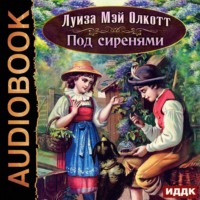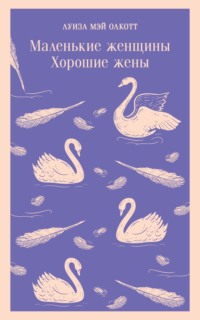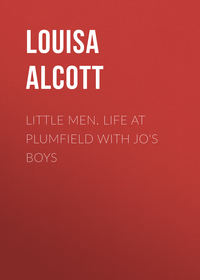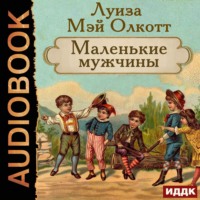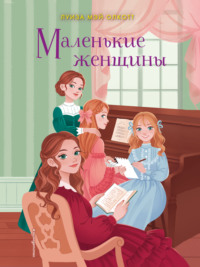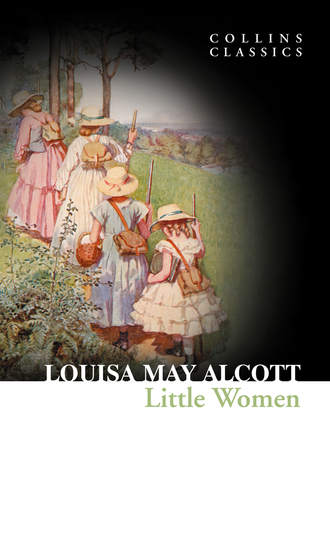
Полная версия
Little Women

History of Collins
In 1819, Millworker William Collins from Glasgow, Scotland, set up a company for printing and publishing pamphlets, sermons, hymn books and prayer books. That company was Collins and was to mark the birth of HarperCollins Publishers as we know it today. The long tradition of Collins dictionary publishing can be traced back to the first dictionary William published in 1824, Greek and English Lexicon. Indeed, from 1840 onwards, he began to produce illustrated dictionaries and even obtained a licence to print and publish the Bible.
Soon after, William published the first Collins novel, Ready Reckoner, however it was the time of the Long Depression, where harvests were poor, prices were high, potato crops had failed and violence was erupting in Europe. As a result, many factories across the country were forced to close down and William chose to retire in 1846, partly due to the hardships he was facing.
Aged 30, William’s son, William II took over the business. A keen humanitarian with a warm heart and a generous spirit, William II was truly ‘Victorian’ in his outlook. He introduced new, up-to-date steam presses and published affordable editions of Shakespeare’s works and Pilgrim’s Progress, making them available to the masses for the first time. A new demand for educational books meant that success came with the publication of travel books, scientific books, encyclopaedias and dictionaries. This demand to be educated led to the later publication of atlases and Collins also held the monopoly on scripture writing at the time.
In the 1860s Collins began to expand and diversify and the idea of ‘books for the millions’ was developed. Affordable editions of classical literature were published and in 1903 Collins introduced 10 titles in their Collins Handy Illustrated Pocket Novels. These proved so popular that a few years later this had increased to an output of 50 volumes, selling nearly half a million in their year of publication. In the same year, The Everyman’s Library was also instituted, with the idea of publishing an affordable library of the most important classical works, biographies, religious and philosophical treatments, plays, poems, travel and adventure. This series eclipsed all competition at the time and the introduction of paperback books in the 1950s helped to open that market and marked a high point in the industry.
HarperCollins is and has always been a champion of the classics and the current Collins Classics series follows in this tradition – publishing classical literature that is affordable and available to all. Beautifully packaged, highly collectible and intended to be reread and enjoyed at every opportunity.
Life & Times
About the Author
Louisa May Alcott was born into a family of American transcenden-talists, the second of four daughters. Transcendentalism was essentially a movement initiated in reaction to a feeling that society was eroding its mores and was consequently in need of reform. Alcott was therefore immersed in an environment of progressive thinking and intellectualization during her formative years. This included a strong moral objection to the notion of slavery, which would become the lynchpin of the American Civil War (1861—5). The Alcott’s hid a runaway slave in their house in 1847 such was their level of commitment to the cause.
During the war itself Alcott worked as a nurse and it was her experiences that served to hone her story-telling skill. It wasn’t until early middle age, however that she became a success. In 1868 the first part of Little Women was published to great acclaim and her reputation grew from there. However, her life was not a long one, for she died of ill health at the age of 55 in 1888.
Apart from the Little Women trilogy, she wrote many other novels and children’s stories, which are better known in the United States. Her writing style remained more or less similar to Little Women, because she was primarily interested in the comings and goings of people in her stories. They are the forerunner of the cast novels written by such modern day writers as Maeve Binchy, where the stories are windows into many interrelated lives.
On a socio-political level, Alcott’s legacy is that she is held aloft as an early feminist and humanitarian. Her high intellect rendered her unable to resist the testing of conventions in her real life and in her literary alter-egos. She lived through the turbulence of the American Civil War and saw America metamorphose into a modern nation where slaves were freed of their literal chains and women were freed of their metaphorical chains. It was a dual emancipation and Alcott effectively documented the event in her prose.
Visit www.AuthorTracker.com for exclusive information on your favorite HarperCollins author.
Little Women
Published in its entirety in 1880, Little Women is a novel about an American family from a female perspective. The author, Louisa May Alcott, based the story on the formative years of herself and her three sisters. It is a novel that says a great deal about people and society without requiring a complex or sweeping plot to carry the reader along.
The primary theme is that siblings each have different personalities despite their having been brought up in the same family environment – nature versus nurture. Alcott gives each of the four sisters particular idiosyncrasies that signature their personalities and generate advantages and disadvantages for them. Thus they are each known for being vain, quick tempered, coy and selfish. To some extent the essay is about the extent to which children live up to their ascribed personality traits once they are known for them, or rather are allotted them as if parents need to compartmentalize their children’s traits. Alcott generally regards the four specific traits as personality flaws, as opposed to strengths, so the four sisters struggle to overcome them rather than embrace them.
Alcott though, was writing at a time when people held deeply Christian values, where the ideal person was the opposite of all of those traits: modest, level-headed, outgoing and giving. The idea was to pretend to be that ideal, albeit an unattainable synthesis. It was all about being virtuous and wholesome in the eyes of the Christian God, although fundamentally it was about being a good prospect as potential wife or husband material in the eyes of others who held the same views.
The title Little Women, has been interpreted in two ways. Firstly, as an expression of the relative unimportance of women in comparison to men, in 19th-century America. Secondly, the title is often read as a statement about the general lack of significance of most people in society. Alcott was certainly a forerunner of the feminist movement, so it seems likely that the title encompasses both meanings: i.e. that women, and especially those of mediocrity, possess a diminutive presence.
The Character of Josephine March
Alcott allegedly based the central character, Josephine March, on herself. She is the one with a furious temper, and acts as a devise by which Alcott can vent her frustrations at the world’s unfairness to women. Like Alcott, Josephine is something of a tomboy and therefore cannot appreciate why society draws a distinction between the genders. As far as she is concerned, women can do anything men can do.
The author’s intention was to make Josephine the perpetual spinster due to her feminist views, but rather ironically, she ended up marrying her off to keep her readership happy, such was society’s desire to see her conform to norms. Josephine struggles throughout the book with the parameters of womanhood. She wishes to take up arms during the civil war and she wishes to attend college, but both ambitions are denied to her. Most of all she is vexed by other people’s expectation of her to mellow her extreme views and find a protective husband. Inevitably this makes her ever more bristly. Little Women was followed by two sequel volumes that took the life of Josephine into middle age. She becomes the governess of a school where she finds her maternal instinct by teaching and caring for her charges.
In some ways the overall story demonstrates how a strong-willed personality can initially baulk at convention, but eventually capitulate once they realize that they are affecting no one but themselves. It’s likely in the modern world that Josephine would be described as ‘high maintenance’ for her initial efforts at resisting expectations, but instead of becoming the neurotic spinster she finds a way to contain herself by using her teaching as a vehicle to express her views. Her husband, who runs the school with her, is able to tolerate her idiosyncrasies because he is an intellectual and finds her intelligence attractive.
Little Women is a complex web of relationships and in this regard it reads rather like an early soap opera, which would go some way to explaining the mass appeal and popularity of Alcott’s books.
Table of Contents
Cover Page
Title Page
History of Collins
Life & Times
PREFACE
CHAPTER 1 Playing Pilgrims
CHAPTER 2 A Merry Christmas
CHAPTER 3 The Laurence Boy
CHAPTER 4 Burdens
CHAPTER 5 Being Neighbourly
CHAPTER 6 Beth Finds the Palace Beautiful
CHAPTER 7 Amy’s Valley of Humiliation
CHAPTER 8 Jo Meets Apollyon
CHAPTER 9 Meg Goes to Vanity Fair
CHAPTER 10 The P.C. and P.O.
CHAPTER 11 Experiments
CHAPTER 12 Camp Laurence
CHAPTER 13 Castles in the Air
CHAPTER 14 Secrets
CHAPTER 15 A Telegram
CHAPTER 16 Letters
CHAPTER 17 Little Faithful
CHAPTER 18 Dark Days
CHAPTER 19 Amy’s Will
CHAPTER 20 Confidential
CHAPTER 21 Laurie Makes Mischief, and Jo Makes Peace
CHAPTER 22 Pleasant Meadows
CHAPTER 23 Aunt March Settles the Question
CLASSIC LITERATURE: WORDS AND PHRASES
Copyright
About the Publisher
PREFACE
Go then, my little Book, and show to all That entertain and bid thee welcome shall, What thou dost keep close shut up in thy breast; And wish what thou dost show them may be blest To them for good, may make them choose to be Pilgrims better by far, than thee or me. Tell them of Mercy; she is one Who early hath her pilgrimage begun. Yea, let young damsels learn of her to prize The world which is to come, and so be wise; For little tripping maids may follow God Along the ways which saintly feet have trod.
Adapted from John Bunyan
CHAPTER 1 Playing Pilgrims
‘Christmas won’t be Christmas without any presents,’ grumbled Jo, lying on the rug.
‘It’s so dreadful to be poor!’ sighed Meg, looking down at her old dress.
‘I don’t think it’s fair for some girls to have plenty of pretty things, and other girls nothing at all,’ added little Amy, with an injured sniff.
‘We’ve got Father and Mother and each other,’ said Beth, contentedly, from her corner.
The four young faces on which the firelight shone brightened at the cheerful words, but darkened again as Jo said sadly:
‘We haven’t got Father, and shall not have him for a long time.’ She didn’t say ‘perhaps never’, but each silently added it, thinking of Father far away, where the fighting was.
Nobody spoke for a minute; then Meg said in an altered tone:
‘You know the reason Mother proposed not having any presents this Christmas was because it is going to be a hard winter for everyone; and she thinks we ought not to spend money for pleasure when our men are suffering so in the army. We can’t do much, but we can make our little sacrifices, and ought to do it gladly. But I am afraid I don’t’; and Meg shook her head, and she thought regretfully of all the pretty things she wanted.
‘But I don’t think the little we should spend would do any good. We’ve each got a dollar, and the army wouldn’t be much helped by our giving that. I agree not to expect anything from Mother or you, but I do want to buy Undine and Sintram for myself; I’ve wanted it so long,’ said Jo, who was a bookworm.
‘I planned to spend mine on new music,’ said Beth, with a little sigh, which no one heard but the hearthbrush and kettle-holder.
‘I shall get a nice box of Faber’s drawing pencils; I really need them,’ said Amy, decidedly.
‘Mother didn’t say anything about our money, and she won’t wish us to give up everything. Let’s each buy what we want, and have a little fun; I’m sure we work hard enough to earn it,’ cried Jo, examining the heels of her shoes in a gentlemanly manner.
‘I know I do – teaching those tiresome children nearly all day when I am longing to enjoy myself at home,’ began Meg, in the complaining tone again.
‘You don’t have half such a hard time as I do,’ said Jo. ‘How would you like to be shut up for hours with a nervous, fussy old lady, who keeps you trotting, is never satisfied, and worries you till you’re ready to fly out of the window or cry?’
‘It’s naughty to fret; but I do think washing dishes and keeping things tidy is the worst work in the world. It makes me cross; and my hands get so stiff, I can’t practise well at all’; and Beth looked at her rough hands with a sigh that anyone could hear that time.
‘I don’t believe any of you suffer as I do,’ cried Amy; ‘for you don’t have to go to school with impertinent girls, who plague you if you don’t know your lessons, and laugh at your dresses, and label your father if he isn’t rich, and insult you when your nose isn’t nice.’
‘If you mean libel, I’d say so, and not talk about labels, as if Papa was a pickle-bottle,’ advised Jo, laughing.
‘I know what I mean, and you needn’t be statirical about it. It’s proper to use good words, and improve your vocabulary,’ returned Amy, with dignity.
‘Don’t peck at one another, children. Don’t you wish we had the money Papa lost when we were little, Jo? Dear me! how happy and good we’d be, if we had no worries!’ said Meg, who could remember better times.
‘You said, the other day, you thought we were a deal happier than the King children, for they were fighting and fretting all the time, in spite of their money.’
‘So I did, Beth. Well, I think we are; for, though we do have to work, we make fun for ourselves, and are a pretty jolly set, as Jo would say.’
‘Jo does use such slang words!’ observed Amy, with a reproving look at the long figure stretched on the rug. Jo immediately sat up, put her hands in her pockets, and began to whistle.
‘Don’t, Jo; it’s so boyish!’
‘That’s why I do it.’
‘I detest rude, unladylike girls!’
‘I hate affected, niminy-piminy chits!’
‘“Birds in their little nests agree,”’ sang Beth, the peacemaker, with such a funny face that both sharp voices softened to a laugh, and the ‘pecking’ ended for that time.
‘Really, girls, you are both to be blamed,’ said Meg, beginning to lecture in her elder-sisterly fashion. ‘You are old enough to leave off boyish tricks, and to behave better, Josephine. It didn’t matter so much when you were a little girl; but now you are so tall, and turn up your hair, you should remember that you are a young lady.’
‘I’m not! and if turning up my hair makes me one, I’ll wear it in two tails till I’m twenty,’ cried Jo, pulling off her net, and shaking down her chestnut mane. ‘I hate to think I’ve got to grow up, and be Miss March, and wear long gowns, and look as prim as a China-aster! It’s bad enough to be a girl, anyway, when I like boys’ games and work and manners! I can’t get over my disappointment in not being a boy; and it’s worse than ever now, for I’m dying to go and fight with Papa, and I can only stay at home and knit, like a poky old woman!’ And Jo shook the blue army sock till the needles rattled like castanets, and her ball bounded across the room.
‘Poor Jo! It’s too bad, but it can’t be helped; so you must try to be contented with making your name boyish, and playing brother to us girls,’ said Beth, stroking the rough head at her knee with a hand that all the dish-washing and dusting in the world could not make ungentle in its touch.
‘As for you, Amy,’ continued Meg, ‘you are altogether too particular and prim. Your airs are funny now; but you’ll grow up an affected little goose, if you don’t take care. I like your nice manners and refined ways of speaking when you don’t try to be elegant; but your absurd words are as bad as Jo’s slang.’
‘If Jo is a tomboy and Amy a goose, what am I, please?’ asked Beth, ready to share the lecture.
‘You’re a dear, and nothing else,’ answered Meg, warmly; and no one contradicted her, for the ‘Mouse’ was the pet of the family.
As young readers like to know ‘how people look’, we will take this moment to give them a little sketch of the four sisters, who sat knitting away in the twilight, while the December snow fell quietly without, and the fire crackled cheerfully within. It was a comfortable old room, though the carpet was faded and the furniture very plain; for a good picture or two hung on the walls, books filled the recesses, chrysanthemums and Christmas roses bloomed in the windows, and a pleasant atmosphere of home-peace pervaded it.
Margaret, the eldest of the four, was sixteen, and very pretty, being plump and fair, with large eyes, plenty of soft, brown hair, a sweet mouth, and white hands, of which she was rather vain. Fifteen-year-old Jo was very tall, thin, and brown, and reminded one of a colt; for she never seemed to know what to do with her long limbs, which were very much in her way. She had a decided mouth, a comical nose, and sharp, grey eyes, which appeared to see everything, and were by turns fierce, funny, or thoughtful. Her long, thick hair was her one beauty; but it was usually bundled in a net, to be out of her way. Round shoulders had Jo, big hands and feet, a fly-away look to her clothes, and the uncomfortable appearance of a girl who was rapidly shooting up into a woman, and didn’t like it. Elizabeth – or Beth, as everyone called her – was a rosy, smooth-haired, bright-eyed girl of thirteen, with a shy manner, a timid voice, and a peaceful expression, which was seldom disturbed. Her father called her ‘Little Tranquillity’, and the name suited her excellently; for she seemed to live in a happy world of her own, only venturing out to meet the few whom she trusted and loved. Amy, though the youngest, was a most important person – in her own opinion at least. A regular snow-maiden, with blue eyes, and yellow hair, curling on her shoulders, pale and slender, and always carrying herself like a young lady mindful of her manners. What the characters of the four sisters were we will leave to be found out.
The clock struck six; and, having swept up the hearth, Beth put a pair of slippers down to warm. Somehow the sight of the old shoes had a good effect upon the girls; for Mother was coming, and everyone brightened to welcome her. Meg stopped lecturing, and lighted the lamp, Amy got out of the easy-chair without being asked, and Jo forgot how tired she was as she sat up to hold the slippers nearer to the blaze.
‘They are quite worn out; Marmee must have a new pair.’
‘I thought I’d get her some with my dollar,’ said Beth.
‘No, I shall!’ cried Amy.
‘I’m the oldest,’ began Meg, but Jo cut in with a decided:
‘I’m the man of the family now Papa is away, and I shall provide the slippers, for he told me to take special care of Mother while he was gone.’
‘I’ll tell you what we’ll do,’ said Beth; ‘let’s each get her something for Christmas, and not get anything for ourselves.’
‘That’s like you, dear! What will we get?’ exclaimed Jo.
Everyone thought soberly for a minute; then Meg announced as if the idea was suggested by the sight of her own pretty hands, ‘I shall give her a nice pair of gloves.’
‘Army shoes, best to be had,’ cried Jo.
‘Some handkerchiefs, all hemmed,’ said Beth.
‘I’ll get a little bottle of cologne; she likes it, and it won’t cost much, so I’ll have some left to buy my pencils,’ added Amy.
‘How will we give the things?’ asked Meg.
‘Put them on the table, and bring her in and see her open the bundles. Don’t you remember how we used to do on our birthdays?’ answered Jo.
‘I used to be so frightened when it was my turn to sit in the big chair with the crown on, and see you all come marching round to give the presents, with a kiss. I liked the things and the kisses, but it was dreadful to have you sit looking at me while I opened the bundles,’ said Beth, who was toasting her face and the bread for tea, at the same time.
‘Let Marmee think we are getting things for ourselves, and then surprise her. We must go shopping tomorrow afternoon, Meg; there is so much to do about the play for Christmas night,’ said Jo, marching up and down, with her hands behind her back and her nose in the air.
‘I don’t mean to act any more after this time; I’m getting too old for such things,’ observed Meg, who was as much a child as ever about ‘dressing-up’ frolics.
‘You won’t stop, I know, as long as you can trail round in a white gown with your hair down, and wear gold-paper jewellery. You are the best actress we’ve got, and there’ll be an end of everything if you quit the boards,’ said Jo. ‘We ought to rehearse tonight. Come here, Amy, and do the fainting scene, for you are as stiff as a poker in that.’
‘I can’t help it; I never saw anyone faint, and I don’t choose to make myself all black and blue, tumbling flat as you do. If I can go down easily, I’ll drop; if I can’t, I shall fall into a chair and be graceful; I don’t care if Hugo does come at me with a pistol,’ returned Amy, who was not gifted with dramatic power, but was chosen because she was small enough to be borne out shrieking by the villain of the piece.
‘Do it this way; clasp your hands so, and stagger across the room, crying frantically, “Roderigo! save me! save me!”’ and away went Jo, with a melodramatic scream which was truly thrilling.
Amy followed, but she poked her hands out stiffly before her, and jerked herself along as if she went by machinery; and her ‘Ow!’ was more suggestive of pins being run into her than of fear and anguish. Jo gave a despairing groan, and Meg laughed outright, while Beth let her bread burn as she watched the fun with interest.
‘It’s no use! Do the best you can when the time comes, and if the audience laugh, don’t blame me. Come on, Meg.’
Then things went smoothly, for Don Pedro defied the world in a speech of two pages without a single break; Hagar, the witch, chanted an awful incantation over her kettleful of simmering toads, with weird effect; Roderigo rent his chains asunder manfully, and Hugo died in agonies of remorse and arsenic, with a wild ‘Ha! ha!’
‘It’s the best we’ve had yet,’ said Meg, as the dead villain sat up and rubbed his elbows.
‘I don’t see how you can write and act such splendid things, Jo. You’re a regular Shakespeare!’ exclaimed Beth, who firmly believed that her sisters were gifted with wonderful genius in all things.
‘Not quite,’ replied Jo modestly. ‘I do think “ The Witch’s Curse, an Operatic Tragedy”, is rather a nice thing; but I’d like to try Macbeth, if we only had a trap-door for Banquo. I always wanted to do the killing part. “Is that a dagger I see before me?”’ muttered Jo, rolling her eyes and clutching at the air, as she had seen a famous tragedian do.


